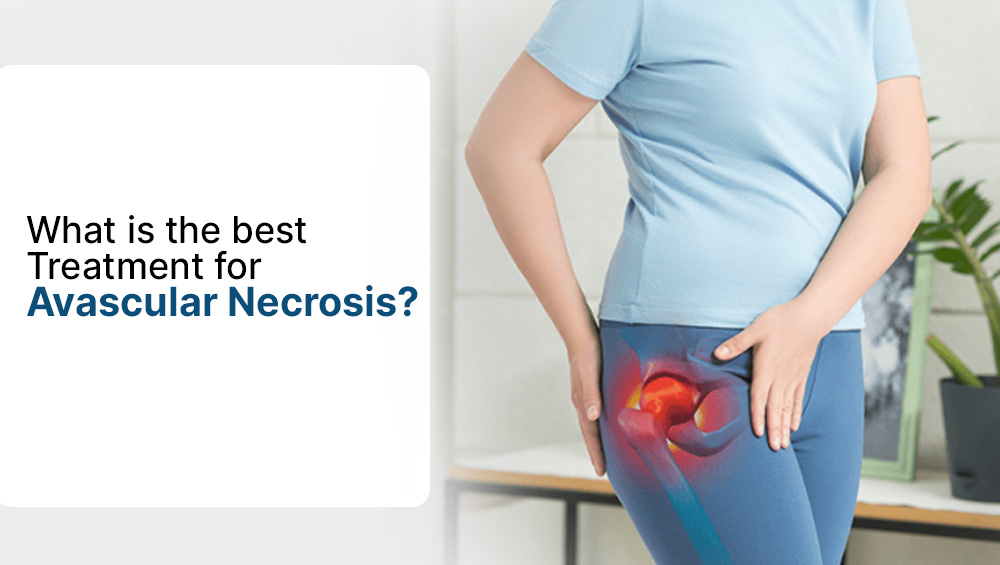Avascular necrosis (AVN), also known as osteonecrosis, is a problem in which the blood supply to some area of bone is disrupted, causing death of the bone tissue. Over time, the bone can collapse, especially in the weight-bearing joints, like the hip. The hip joint, and more precisely the femoral head, is the most frequently affected site of AVN, while other bones including the shoulder, knee, and ankle may also be involved. Treatment for Avascular Necrosis (AVN) depends on the severity of the condition, and in some cases, avascular necrosis medication is used to manage symptoms and help prevent further deterioration of the bone.
Causes and Risk Factors
There are a number of causes of avascular necrosis. The most common causes are the following:
- Trauma: Any fractures or dislocations that injure adjacent blood vessels can cause AVN.
- Steroids: Prolonged corticosteroid use predisposes to AVN.
- Heavy Drinking: Alcohol reduces your body’s ability to create new, strong bone.
- Medical Problems: Suffering from such ills as sickle cell anemia, lupus or blood clotting disorders can raise the risk.
- Idiopathic: The cause is unknown in some cases.
Symptoms of AVN
AVN might not produce any symptoms in the beginning. But, as the disease advances, people might experience:
- Persistent joint pain
- Pain with movement and at rest
- Limited range of motion
- In some cases, it may lead to: walking with a limp (if the hip is involved).
Diagnostic Approaches
When it’s causing symptoms, Avascular Necrosis (AVN) can be diagnosed through a combination of:
- Physical exam: Examining the joint for tenderness and mobility
- Imaging Tests
- chest x-ray (typically normal in the early stages)
- MRI (most sensitive for early AVN)
- CT or bone scan as appropriate
Treatment options for AVN that works best
Avascular necrosis treatment varies depending on the stage of the disease, your age, and your overall health and the bone involved. AVN Hip Treatment options range from conservative measures to more operative interventions.
1. Medications and Conservative Treatment
For early-stage AVN:
Nonsteroidal anti-inflammatory drugs (NSAIDs): Aid in pain relief and help decrease inflammation.
Bisphosphonates: Drugs that can help slow the rate of bone destruction.
Blood-Thinning Medications: May be given in specific circumstances to increase the flow of blood to the region.
Dislipidemia medication: Occasionally applied in the case of fatty deposits causing the reduction in blood supply.
2. Lifestyle Modifications
Avoiding Weight-Bearing Activities: Place less demand upon the diseased joint to potentially prevent further bone damage.
Physical Activity: Exercises to preserve joint flexibility and muscular strength.
3. Core Decompression Surgery
Core decompression may be indicated in patients with early and mid-stages of AVN. This is done by shaving out some of the inner wall of the bone to relieve pressure and make room for new blood vessels to grow in to increase blood supply.
Bone Grafting
Core decompression can be combined with bone grafting. It’s a procedure that involves moving healthy bone material to prompt damaged bone to grow back.
Stem Cell Therapy
In some cases, when a surgeon uses core decompression with stem cell therapy, regenerative cells are injected into the bone to encourage healing.
Osteotomy
For some cases, particularly in a younger patient, an osteotomy is performed to move the weight off of the affected area.
Total Hip Replacement (THR)
The treatment of advanced stages of AVN is total hip replacement (arthroplasty), when the bone has collapsed and joint cartilage is significantly damaged. With current techniques and materials, hip replacement surgery is a highly successful procedure with long lasting results.
What Is the Best Treatment for Avascular Necrosis (AVN)?
There is no two cases that are the same in AVN, and necrosis treatments must be personalized. Variables that play a role in the selection of therapy are:
- The stage of AVN (incipient, progressive, or terminal)
- Age of the patient and their general health
- Demand and activity levels
- Which joint is affected
It requires a thoughtful conversation with an experienced orthopedic surgeon to make the best decision.
Conclusion: AVN Specialist in Gurgaon
The surgical expertise of the orthopedic surgeon is a major factor in the outcome or success of treatment of avascular necrosis. Dr Yugal Karkhur is a renowned name for the treatment of hip disease including AVN.
Orthopedic doctor, A joint specialist for the last 14 years, Dr. Karkhur sees hundreds of AVN patients who like to be treated with conservative treatments. He’s very proficient with hip replacement and only does it when all noninvasive or joint-sparing techniques have been tried.
Thorough treatment protocols are provided to all our patients who have consults with Dr. Yugal. His step by step guidance ensures that you leave with a plan that is uniquely for you and that you are not left out in the cold. Dr. Yugal specializes in Treatment for Avascular Necrosis (AVN) and employs the latest techniques in surgery that are the best in safety, efficacy, and for faster recovery.
It does not help to hesitate. If you are living with chronic joint pain, AVN, or are recovering from trauma, there is a life-changing opportunity waiting for you beyond early diagnosis and treatment.
Start on the path to effective treatment today by contacting Dr Yugal Karkhur and enquiring an appointment to get your freedom and life back now.
Relax… Your healing begins right now. Dr. Yugal is just one click away, so go ahead and book an appointment.

